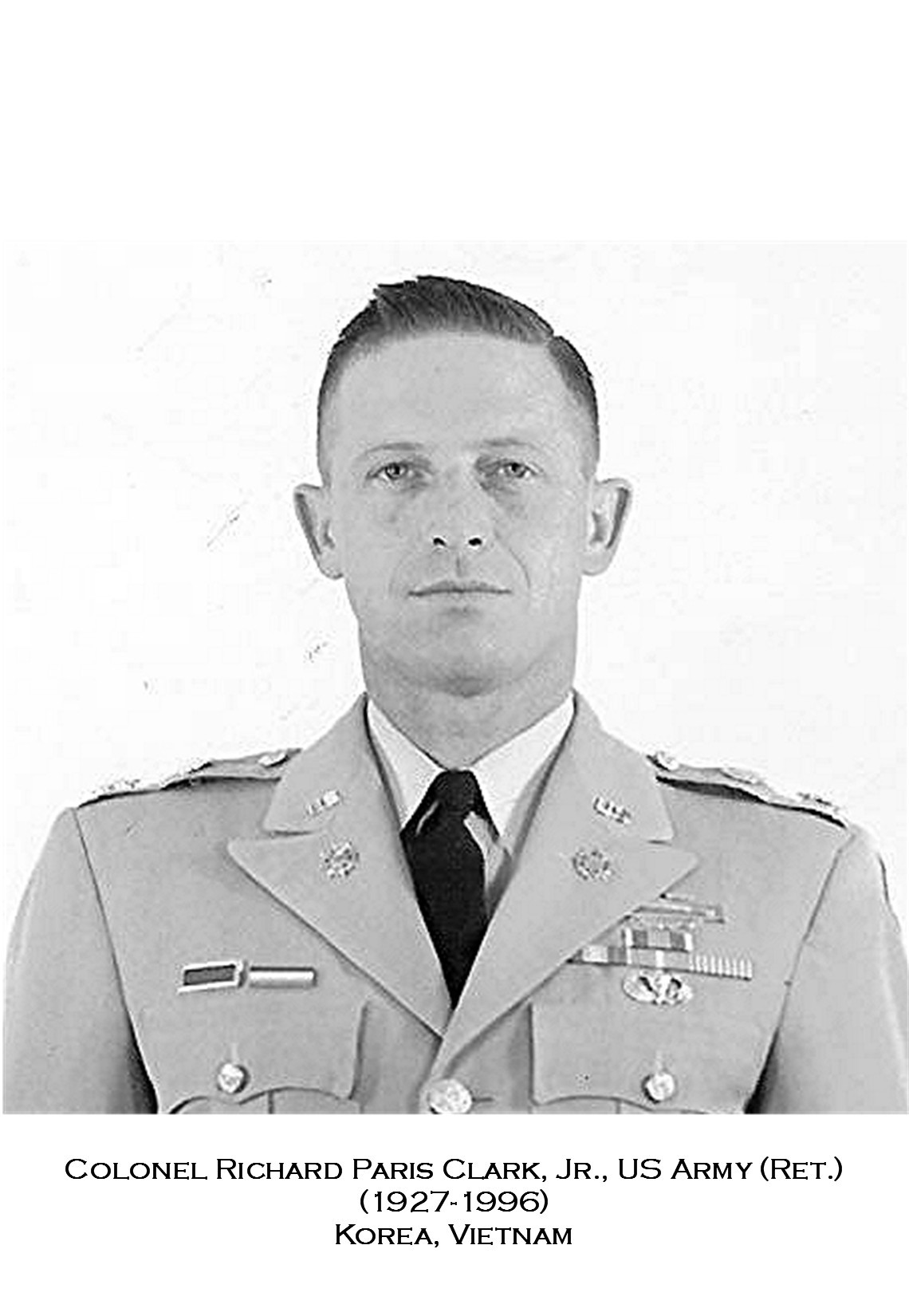Colonel Richard Paris Clark, Jr., U.S. Army
(1927-1996)
Korea, Vietnam
Courtesy of his son, J. R. Clark,November 2006
Richard Paris Clark, Jr., was born in Century, Florida on December 1, 1927. He grew up in Montgomery, Alabama and graduated from Sidney Lanier High School in 1946. As a high school and college student, Clark worked as a sportswriter and city reporter for the Montgomery Advertiser daily newspaper. He attended Troy State Teachers’ College and Livingston State Teachers’ College and served as the sports information director for both colleges’ athletic departments before enlisting in the US Army in 1948.
Clark was commissioned a Second Lieutenant and completed Infantry School and the Basic Airborne Course in the summer of 1950 before the Army assigned him to the 187th Airborne Infantry Regiment and immediate deployment to Korea. As a rifle platoon leader of Company M, Clark led his unit in combat jumps at Sukchon and Munsan-ni against North Korean and Communist Chinese forces.
After he rotated back to the States in 1951, Clark married Patricia Clinton of Montgomery and the couple moved to his new duty assignment in the 325th Airborne Infantry Regiment at Fort Bragg. As a member of the 2nd Battalion (White Falcons), he served as platoon leader, motor officer, adjutant, and assistant regimental operations officer.
In 1954, Clark was promoted to Captain and assigned to the 4th Infantry Division, U.S. Army Alaska, where he commanded a heavy weapons company and served as public information officer for the Yukon Command.
He drew staff duty in the Adjutant General’s Office, Department of the Army, as a personnel management officer in the Infantry Branch from 1956 to 1958. While at the Pentagon, Clark earned a B.S. in military science from the University of Maryland, obtained a commission in the Regular Army, and transferred to the Transportation Corps.
Following completion of T-School at Fort Eustis, the TC sent Clark to the University of Tennessee, where he earned a master’s degree in transportation and logistics in 1959. He returned to Fort Eustis and between 1959 and 1961 served as G-3 and assistant commandant of the NCO Academy, commanded the 63rd Truck Company, and was promoted to Major.
The Army selected Clark for the Command and General Staff College at Fort Leavenworth and in 1962 graduated with the second-highest honor then awarded by CGSC, the Commandant’s Award for Effective Military Writing. He served an additional tour at Leavenworth from 1962 to 1965 as an author and graduate faculty member in the Department of Command at CGSC.
In the summer of 1965, Clark received orders for Vietnam, where he managed all intra-theater transportation assets as Chief of Movements Branch and Special Assistant to the J-4, Military Assistance Command, Vietnam from 1965-1966. While in Saigon, Clark was instrumental in establishing the Traffic Management Agency (TMA) in addition to helping MACV and the Military Sea Transport Service secure a contract with the Alaska Barge and Transport Company.
Clark returned from Vietnam to attend the Armed Forces Staff College, which he completed in 1967 and subsequently served a short tour as a staff officer with DCSLOG in Washington. He was promoted to Lieutenant Colonel and was selected for the Army War College at Carlisle Barracks, where he graduated in the summer of 1968.
He returned to Fort Eustis to command the 714th Transportation Battalion and serve as special assistant to the chief of staff, U.S. Army Transportation Center. Clark was promoted to Colonel in 1970 and completed the Logistics Executive Development Course at Fort Lee, Virginia.
Clark was a staff officer in the Mobility Operations Division of J-4, Joint Chiefs of Staff, from 1970 to 1973, during which he suffered a stroke that effectively ended his military career. He completed twenty-six years of active duty while serving as chief of transportation, DCSLOG, Forces Command, Fort McPherson, Georgia, in December 1974. He was awarded the Parachute Badge, the Glider Badge, the Combat Infantryman Badge, Korean Service Medal, a Presidential Unit Citation, the United Nations Service Medal, the Army Commendation Medal (with 3 OLC), the Bronze Star Medal, the Vietnam Service Medal, the Joint Chiefs of Staff Badge, and the Legion of Merit (with 2 OLC).
After retirement, Clark worked for the state of Georgia, pursued a Ph.D. in vocational education at Georgia State University, ran for a seat on the DeKalb County, Georgia, school board, was director of continuing education at GSU from 1979 to 1986, endured quadruple bypass surgery, and served a one-year term as president of the Stethem Ferry Homeowners’ Association in Alpharetta, Georgia, in 1995.
In the summer and fall of 1996, he had a series of heart attacks that ultimately led to his death on October 19, 1996 in Atlanta. He “stood in the doorway” exactly thirty-six years to the day of his first combat jump behind enemy lines in North Korea.
Colonel Clark’s wife, Patricia Dolores Clinton Clark, died of cancer on February 14, 2000, in Chesapeake, Virginia, and is buried with him in section 60, grave 2928.
CLARK, RICHARD PARIS JR
COL US ARMY
KOREA, VIETNAM
- DATE OF BIRTH: 12/01/1927
- DATE OF DEATH: 10/19/1996
- BURIED AT: SECTION 60 SITE 2928
ARLINGTON NATIONAL CEMETERY
CLARK, PATRICIA CLINTON
- DATE OF BIRTH: 03/17/1930
- DATE OF DEATH: 02/14/2000
- BURIED AT: SECTION 60 SITE 2928
ARLINGTON NATIONAL CEMETERY
WIFE OF CLARK, RICHARD PARIS JR COL US ARMY
Michael Robert Patterson was born in Arlington and is the son of a former officer of the US Army. So it was no wonder that sooner or later his interests drew him to American history and especially to American military history. Many of his articles can be found on renowned portals like the New York Times, Washingtonpost or Wikipedia.
Reviewed by: Michael Howard


